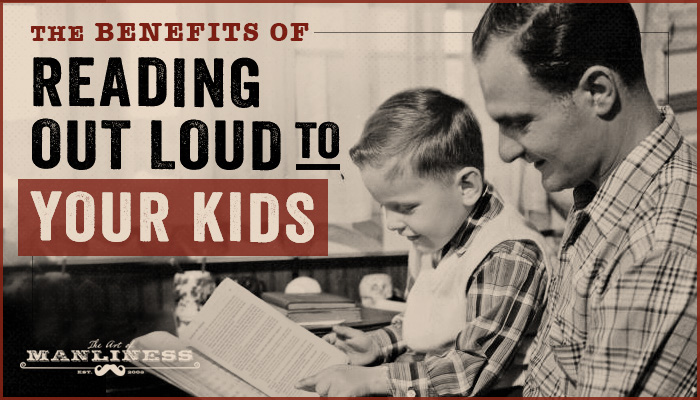
“People would stand in line for days and pay hundreds of dollars if there were a pill that could do everything for a child that reading aloud does. It expands their interest in books, vocabulary, comprehension, grammar, and attention span. Simply put, it’s a free ‘oral vaccine’ for literacy.†—Jim Trelease, The Read-Aloud Handbook
Are you looking for a way to help increase your child’s vocabulary? To instill moral values and lessons? To improve your conversations with them? Then look no further than the wonders of reading aloud to your children. As Jim Trelease notes in the quote above, this simple act practically works like a magic pill — a super multivitamin — in the lives of your kids. Reading aloud imparts many tangible benefits (we’ll dig into them below) to your children’s minds and character, but the more intangible rewards are equally important: it’s just plain enjoyable to see the delight on a child’s face when they encounter a good book, and oral reading sessions can really bring the family together — for many children, one of their warmest, most comforting memories is of their father’s voice narrating a tale as they lay snug in their beds.
Let’s get into the specific benefits of this wonderfully magic activity, and then provide some specific tips to make it better and more enjoyable for your kids.
The Benefits of Reading Aloud to Your Children

There are many benefits to reading out loud to your kids; while some of those listed below apply to children reading on their own as well, listening to a story also imparts unique advantages.
Helps children grasp big picture aspects of narrative. Especially early on, it takes a lot of mental power just to form the words and sentences, let alone comprehending them and being able to follow plot lines and big themes. Thus, when read aloud to, kids are more able to appreciate stories and lessons and big picture ideas. And, these benefits carry over all the way through middle school, and even beyond.
Increases vocabulary and an understanding of sophisticated language patterns. When you read aloud to a kid, you build up their storehouse of words and grammatically correct phrases and sentences. This increased vocabulary helps them out in conversation, in their writing, and in their general communication skills (which employers say are lacking in younger generations). Andrew Pudewa, president of the Institute for Excellence in Writing, even says “The best way to help children grow to be good communicators [is] to read aloud to them as much as possible.†From increasing one’s general understanding of the world, to becoming more persuasive, to even having a better first impression, the benefits of a robust vocabulary are numerous.
Now, you’d think that simply talking to your kids a lot would do the same thing, but while overhearing conversation does help, the reality is that we tend to be lazy speakers. We don’t usually use a wide variety of words (especially when talking to/with children because we think they won’t understand) and we aren’t always grammatically correct. When we talk, we generally aren’t taking the time to form well-thought-out sentences. Thus reading to your kids from books actually improves their vocabulary and literacy more than just talking to them a lot. (As a related side note, don’t be afraid of using your full range of vocabulary with your kids; they obviously won’t get everything, but they can put together more than they’re often given credit for, and it builds up their storehouse of words even more.)
Instills moral lessons and heroic values. If you’re a parent, you know that your kids often listen to outside sources better than they listen to you. They’re better behaved for teachers and grandparents, and often more readily heed their advice. It’s just how it goes. The same thing can happen when you read books to your kids. Rather than you imparting life lessons, the stories and characters in those stories get to do so. And oh how powerful it is! The examples of heroes in our stories can inspire and motivate in a unique way. C.S. Lewis writes, “Since it is so likely that they will meet cruel enemies, let [children] at least have heard of brave knights and heroic courage. Otherwise you are making their destiny not brighter but darker.â€
A final word on this from Sarah Mackenzie, author of The Read-Aloud Family:
“A didactic lesson or reprimand from Mom or Dad will only go so far. There is simply no substitute for story. When it comes to imparting truth to our kids, nagging lectures from an adult simply can’t compare with a story whose time has come. A story meets the child where he is. It sparks an authentic desire within him to do better, try harder, and love more. It allows each of our kids a vicarious experience, giving them the precious gift of practice. Stories reach us where nothing else can and quicken the heartbeat of the hero within us.â€
Read aloud to your kids, and inspire their heroic imagination.
Facilitates important conversations. Related to the above is that a good book can foster a conversation that may not have happened otherwise. It isn’t easy to randomly bring up the topics of courage and bravery, and their importance in life, but if you’ve read The Wizard of Oz to and with your kids (as Mackenzie did), it’s a natural discussion to have. She notes: “I’m not sure I could have pulled off that conversation on my own if the story hadn’t propelled us.â€
Improves test scores. While test scores aren’t the be-all and end-all of a child’s intelligence or the final predictor of their success in life, it should be obvious that higher test scores are better than lower test scores. If you could easily do something to improve your child’s test scores, wouldn’t you do it? Rather than pay for expensive tutors or private schooling, just read to them. It’s been shown that test scores improve the more a child is read to, all the way up through 7th grade (and possibly higher, but that’s where that specific study ended).
Builds empathy. It’s been shown that reading builds empathy (especially fiction), and that benefit extends to kids as well. You likely know from your own experience that reading someone’s memoir from war-torn Africa is far more impactful than hearing a story about it on the news. It connects you to the situation much more viscerally, and you’re more likely to do something about it afterwards (in the form of telling other people, making donations, getting involved in the cause, etc.). If you want your kids to care about the world around them, and be inspired to make it a better place, read to them.
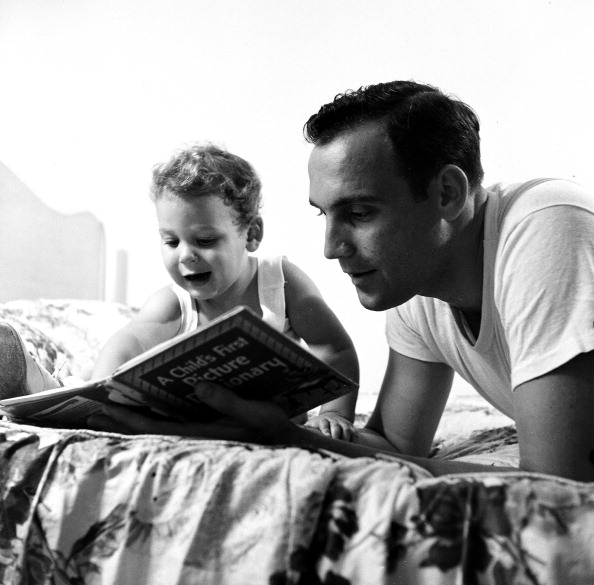
Instills a lifelong love of reading. The benefits of reading as an adult are too numerous to list here, and you probably know what they are anyway. Books delight, inform, inspire, and challenge — they serve as life-long mentors and companions. Most adults who have a love affair with reading got started very young, often in their own home (or community) libraries, as was the case with Teddy Roosevelt, Louis L’Amour, George S. Patton, and numerous other important men throughout history. Decades ago, before TV or even radio, entertainment often consisted of the family (and even groups of adult friends) sitting around and reading a book out loud to each other.
Reading to your kids from a young age and continuing through even the teenage years is the best way to help them understand the power and beauty of the written word.
It’s a fun way to spend quality time with your kids. Beyond all the above tangible benefits of reading to your kids, it’s just a really fun way to spend time with them. In a world of digital devices and toys that are filled with buttons and parent-annoying-noises, reading to your kids is a (relatively) calm, grounding activity that can be enjoyed by parent and child alike (which are few and far between). Whether it’s picture books with your toddler (find ones with fun stories and great artwork, and you’ll enjoy it too, though perhaps less so after you’ve read it 100+ times!), or short novels with your older child, reading is an activity that will inspire and delight both of you.
Tips for Successfully Reading Aloud to Your Kids
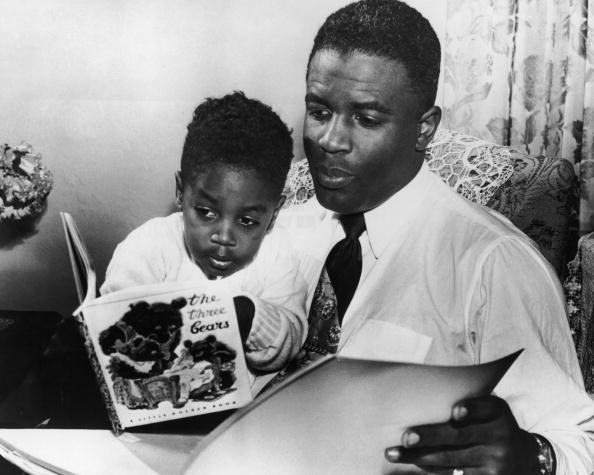
“Children are made readers in the laps of their parents.†—Emilie Buchwald
Reading aloud more often to your children doesn’t have to be a chore; it’s something you can work into your current routine by incorporating just a few easy habits.
Read to kids of all ages. When you’re a parent, it would seem like reading to kids takes place primarily in the sweet spot of about 1 year old to age 5 or 6 when they can start to read on their own. Before that, it feels like you’re sort of just wasting time, and beyond that, they can read for themselves. Right? Wrong!
I noticed that it was at about 1 year old that my son started to really enjoy being read to. He could turn the pages, point to the pictures, etc. Before that, we still read to him, but it almost felt like we were doing it for our own sake as parents (to have an activity to do with him) rather than for his own benefit. Research shows, however, that the benefits of reading to your kids start right away (and even in utero). As they hear your voice more, their connection to you becomes even stronger. And as they hear more and more words and phrases, their understanding of the world comes together a bit quicker. Now, this doesn’t mean they’ll necessarily talk sooner, or read on their own sooner, but they will come to comprehend things better than if you hadn’t read to them at all.
On the other end, reading aloud to your kids shouldn’t end when they can read on their own. As noted above, especially in the early years of independent reading, it takes a lot of mental power just to comprehend individual words and sentences, let alone stringing them together to form complete thoughts. They have the capacity to understand more complex stories, but quite possibly only in the form of being read to.
So as your kids grow up, don’t think of them as graduating from listening to books read aloud, but rather graduating to listening to meatier, more complex books. As they get older, they’ll gain the attention span to follow the narrative of longer, picture-free chapter books for weeks and even months. Not only is this phase enjoyable for your children, but it’s a golden time for you, too, as you’ll likely enjoy getting into the story as well.
Create a book club culture at home. Rather than making reading simply another assignment, or forcing your kids to sit calmly while you read to them and explain the story, work to create a book club culture in your home.
What does that mean? Well, what do you do at a book club meeting? You make small talk, perhaps about the book, but also about topics that go afield from it. You usually eat some tasty victuals and share drinks (in the adult book club my wife and I are part of, we try to pair those snacks and drinks with the book; for instance, red wine with The Sun Also Rises and Polish vodka with a WWII story set in Poland). You then enter into an open-ended discussion of the book — the characters you resonated with, parts you didn’t like or maybe disagreed with, the lessons or takeaways you don’t want to forget. You don’t go through a quiz to gauge your understanding of the plot or write a short essay on the main themes (like one would do in a school setting).
Aim for the former rather than the latter when it comes to talking about books at home. Don’t just quiz your children about main characters, but have real discussions with them. Ask good questions to really get to the heart of the matter. Some ideas from Mackenzie:
- What does the character want? What’s the obstacle?
- What is the character most afraid of?
- Should he/she have done that?
- Who is the most ______ in the story? (brave, courageous, selfish, faithful, foolish, careful, dangerous, noble, resourceful, etc.)
- What does this story or character remind you of?
- What would you change about the setting or main character if you could?
- What surprised you the most?
- What’s something you don’t want to forget from this book?
In addition to fostering good, meaningful conversation, do your best to make it a fun atmosphere. Have some tasty snacks and/or drinks and even take a cue from our book club and pair your refreshments with the book. Reading a Harry Potter book? Make some butterbeer (there are a million recipes online). Charlie and the Chocolate Factory? Whip up a “Fizzy Lifting Drink.†You get the idea.
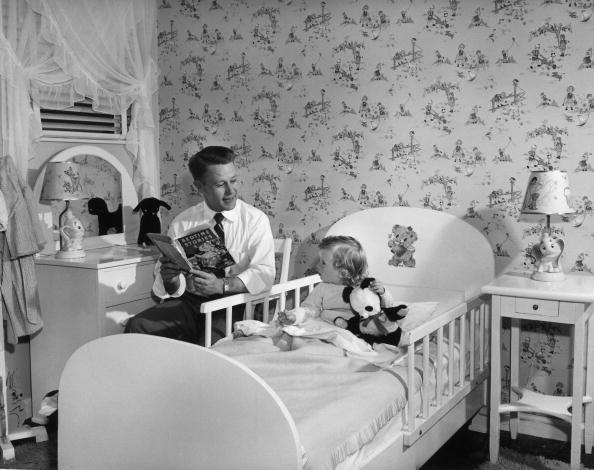
You only need ~10 minutes per day, ~3 times per week. Remember all those benefits of reading aloud to your kids listed above? You don’t need to do it 30 minutes per day to see them. You don’t even need to do it 10 minutes every day. Rather, those benefits are seen in reading aloud to kids for as little as 35 minutes a week. Obviously, the more you read the better, but sometimes things are just too chaotic. Rest assured, you only need small snippets of time to see the benefits accrue.
Take advantage of audiobooks. Sometimes kids don’t necessarily want to hear Mom or Dad’s voice any more than they already do. Plus sometimes you just need a break and perhaps want to sit back and enjoy the story yourself. Give audiobooks a shot! They’re especially great for car trips, and not just long ones either; if you drive your kid 10 minutes to and from school every day, you can listen to 100 minutes of a book with him or her each week.
Audiobooks are a great way to get stories into a kid’s head. Beyond just the convenience, the production level is top notch. While there’s something comforting and indelible about a parent’s voice, it’s also nice to listen to a professional performance sometimes, which offers greater enthusiasm, and especially with children’s stories, often more sound effects. They tend to be just a little more engaging. As Mackenzie writes, “It’s the shared experience itself that makes the biggest impact, whether the voice doing the actual reading is your own, your spouse’s, or a professional actor’s via an audiobook.â€
Have a house full of books. As mentioned above, many famous men’s love for reading began in their early boyhood, and it was very often their home life — a house filled with books and parents who modeled regular reading — that sparked their initial interest. Research in fact shows that children in homes where books are plentiful benefit — in terms of improved test scores — from their mere presence. And this is especially true in low-education and low-income homes. The research even shows that no matter how many books your home already has, every addition benefits your children even more (*here’s to hoping my wife reads that part*).
Stocking your house with books not only encourages your children’s interest in reading on their own, but also facilitates your reading to them; kids are more excited about engaging in parent-child reading time when there’s a good selection of books to choose from on the shelf.
So whether you buy them or check them out from the library, aim to always have stacks and shelves of books on hand. Also make it a habit to buy your child a book for holidays and birthdays to build their own collections. Make books a prominent part of your family culture.
Read for fun! When kids get to school age, it can be tempting to just go with what’s assigned by their teachers. But that instills an idea that reading is primarily about school, and getting good grades. Research shows, though, that reading for fun — simply to while away the time and enjoy a good story — boosts their brains as well. Read aloud when it has no other purpose but enjoyment!
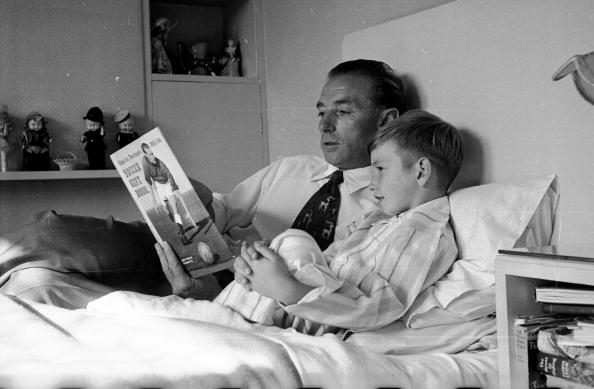
Be patient and set reasonable expectations for what success looks like. Most children are surprisingly attentive to being read aloud to; even a normally pretty active kid can often sit still for a story. But some are more fidgety than others, especially if you didn’t read to them from a very early age and are trying to get into the habit later. Don’t be discouraged, though. Try to do your reading sessions when they’re naturally a little calmer (like before bedtime), consider giving their hands something to fidget with as they listen, and make the continuance of the story contingent on their paying relatively good attention (a few interruptions and off-topic tangents are entirely normal); most kids would rather behave and extend the time before they have to go to sleep than get the story cut off and have to go to bed sooner!
Perhaps the most magical thing about reading aloud to your kids, is that it not only accrues all the benefits above, but that it helps foster a child’s interest in reading on his or her own. As a father you act as a kind ambassador for books, and all the bedtime stories you share over the years help carry a lifelong love of them to your child’s heart.


